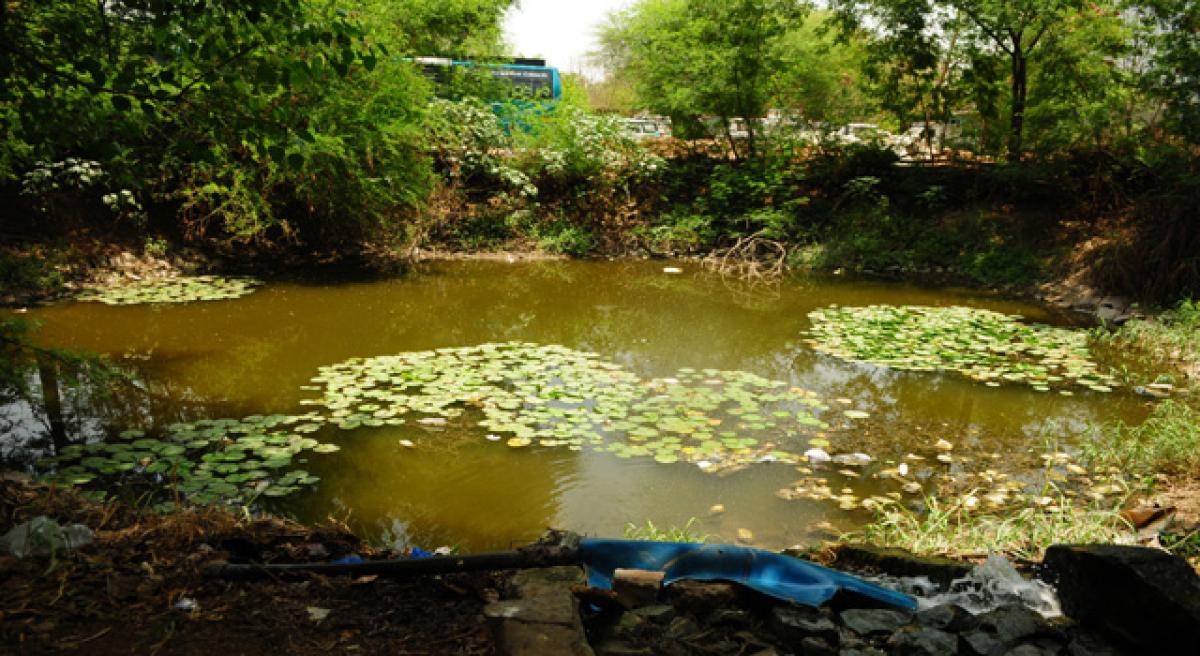Live
- Govt unveils ‘Jalvahak’ to boost inland waterways
- List of criminals: Delhi BJP chief on AAP panel of 38 candidates
- PSBs in India clock record Rs 1.41 lakh crore in net profit in FY24
- Telangana Government Announces Key Development Plans: Bhatti Vikramarka
- Crackdown on illegal poppy farming in Manipur: Assam Rifles destroyed 6,228 acres in 5 years
- South Korea's ruling party leader cancels press conference amid calls for resignation
- AIADMK's big meet discusses 2026 polls, prospective alliances
- BJP questions Congress-Shiv Sena (UBT) alliance over Aaditya Thackeray's Savarkar-Nehru remark
- Maha Oppn to boycott customary CM tea meet, cites rising farmers' distress, atrocities against Dalits
- Mikheil Kavelashvili is new Georgian President
Just In

A little fall in the pressure from the groundwater bore wells during summer and water logging with the onset of rainy season had made officials to take up water harvesting initiative at a 12 acre campus of the Regional Transport Authority (RTA) office at Nagole.
A little fall in the pressure from the groundwater bore wells during summer and water logging with the onset of rainy season had made officials to take up water harvesting initiative at a 12 acre campus of the Regional Transport Authority (RTA) office at Nagole.
The RTA office at Nagole has several testing tracks to issue driving licenses to two and four wheeler as well as heavy vehicles. Earlier, there was a water body in the area where the RTA office and adjacent areas were located.
It was for this reason that water was accumulated in the 12 acre campus during the rainy season posing a problem by submerging the testing tracks. Although there was no acute water problem in drawing groundwater in the area there were early signs of depletion of water table found as the pressure of water from the bore wells falling.
“It was against this backdrop that steps had been taken to harvest the rain water on the one hand to recharge the ground water by pumping the water logged during the rainy season and to arrest fall in the ground water levels,” said RTA official VSVV Prasad Reddy.
As part of the initiative two injection bore-wells were constructed in the campus one with 150 and another with 200 feet depth. The injection wells were constructed in such a way that the water logged during rainy season would directly go down to the water table. “However, steps were taken to ensure that the water logged in the campus gets filtered before seeping into the injection wells,” the official added.
“The whole exercise was completed ahead of the rainy season in May, 2016. And, the results are there to see now. With only one season of rainwater harvesting the bore-wells in the campus draw groundwater with the same pressure as if we draw during the rainy season,” said Reddy.
“Besides, there was a dried up open well in the campus. But, water harvesting initiative has recharged the open well and water has been available in the well since the end of the last rainy season. And, we also released fish to keep the water clean in the well, the official clarified,” he said.
Elaborating, the official said that the water sent down though the injection wells in one season could repair the fractured lines of the water body earlier existed in the area. “In turn it has rejuvenated the ground water table in the area,” he said.
“This not only helped in keeping the levels of the water table intact but it has also helped in the vegetation in the campus remained green and even in the high temperature this summer not a single plant in the campus suffered lack of water,” he pointed out.
The officials added that 4,000 more plants like Vepa (neem), Kanuga (Millettia pinnata) and other varieties were planted under the Telanganaku Haritha Haram (THH) programme and the survival rate of the plants is 100 per cent.
The water harvesting initiative resolving the water logging in the campus and recharging the groundwater levels and to keep up the greenery. Besides, the initiative also benefited the Aadharshanagar colony located behind the RTA office as no problems are faced in drawing ground water by the residents.
“Instead of waiting and thinking that you'll do something later only when faced with the water shortage, we adopted a simple, one forward step in harvesting rainwater. This brought definite and assured results is what we have experienced and there for all to see,” he said.

© 2024 Hyderabad Media House Limited/The Hans India. All rights reserved. Powered by hocalwire.com







